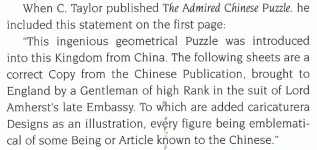oldbei
Junior Member
- Joined
- Dec 9, 2014
- Member Type
- Student or Learner
- Native Language
- Chinese
- Home Country
- China
- Current Location
- Canada
A quote from a book (The Admired Chinese Puzzle by C. Taylor): "To which are added caricaturera Designs as an illustration, every figure being emblematical of some Being or Article known to the Chinese."
My Questions:
1. The word "caricaturera" doesn't seem to be an English word. Is it commonly known to native English speakers?
2. What does "which" stand for? As a rule, can you use a relative pronoun to refer to something mentioned in previous sentences?
3. Why are the words "Designs," "Being," and "Article" capitalized? Is it for emphasis? Is this a good way to emphasize words?
4. Does "every figure" refer to "caricaturera Designs?"
My Questions:
1. The word "caricaturera" doesn't seem to be an English word. Is it commonly known to native English speakers?
2. What does "which" stand for? As a rule, can you use a relative pronoun to refer to something mentioned in previous sentences?
3. Why are the words "Designs," "Being," and "Article" capitalized? Is it for emphasis? Is this a good way to emphasize words?
4. Does "every figure" refer to "caricaturera Designs?"
Last edited by a moderator:
